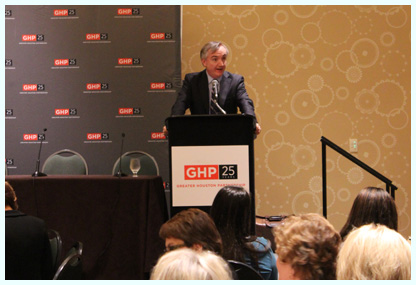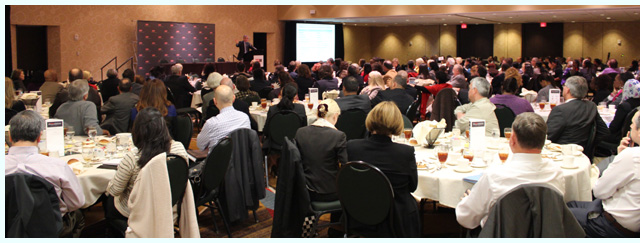 On November 12, the Greater Houston Partnership (GHP) held a Workforce Development Summit as part of their UpSkill Houston initiative at which Joseph Fuller, Senior Lecturer at the Harvard Business School, was the luncheon keynote speaker. Gina Luna, GHP Vice Chairman and Chairman at JPMorgan Chase in Houston, introduced him to the gathered group of business leaders, educators, and representatives from community organizations.
On November 12, the Greater Houston Partnership (GHP) held a Workforce Development Summit as part of their UpSkill Houston initiative at which Joseph Fuller, Senior Lecturer at the Harvard Business School, was the luncheon keynote speaker. Gina Luna, GHP Vice Chairman and Chairman at JPMorgan Chase in Houston, introduced him to the gathered group of business leaders, educators, and representatives from community organizations.
After some opening remarks, Mr. Fuller began the meat of his presentation by explaining why projects like UpSkill Houston are so crucial. He said,
“Something good has to happen here, because this city, this state, the energy sector – and more importantly and more profoundly – the country is suffering from a wasting disease, and the waste is that we are not investing in the skills of young people or people who have been displaced from the workforce, and therefore they do not have an avenue to either restore their standard of living or get on a path of having a better standard of living that is going to support household formation and successful marriages. That type of demographic that we have seen in the workforce, a hollowing out of the middle of the workforce making it shaped more and more like a barbell, is a clear and present danger to our economic competitiveness and to our social cohesion as a country. And I know that sounds very melodramatic, but after18 months of studying this and visiting with people all around the country – people ranging from Cabinet Secretaries to people running programs in junior colleges – that is my absolute conviction.”
Mr. Fuller explained that the Harvard Business School surveyed their alumni to ask for their points of view as to what are areas in which the United States has been highly competitive historically or simultaneously competitive versus other developed economies, and where the U.S. is declining relative to other economies or relative to our historical level of performance. One of the issues that emerged from this survey was that there is a real perception that the skills base of our economy has eroded, both relative to other developed countries and relative to our history.
In order to decide where to focus on the problem, the Harvard Business School defined what it means to be competitive. The two-part objective lies in the ability of firms operating in the United States to be able to compete successfully in the global economy while supporting high and rising standards of living for average citizens. Historically, the focus has been on the first part of that definition, but over time they have observed that focusing only on maximizing the business return did not serve the best interest of the country.
After explaining in detail what is meant by middle-skills jobs and why there are not currently enough people seeking futures in these career paths, Fuller stated that it is imperative for business leaders to accept that the middle-skills deficit is not going to go away unless they take the “mantle of leadership” to solve this problem. He said that educators and policy makers are often “shooting into a fog bank” because employers “don’t specify what they need, don’t generate feedback about what is effective for people who apply for jobs, don’t forecast their workforce development needs, and haven’t changed their human resource practices to reflect the 21st century.”
Mr. Fuller had the following recommendations for addressing the middle-skills gap:
- Businesses need to develop an accurate understanding of the all-in cost of job openings turnover. Most companies don’t understand just how much it costs them to have an ineffective talent pipeline.
- Educators need to think of the business community like a customer that they are trying to support and serve. They will get support from Business if they give support.
- Policy makers need to leverage and improve information systems on the jobs market.
Mr. Fuller concluded with a quote from the Wall Street Journal about a study being released that day titled Bridge the Gap: Rebuilding America’s Middle Skills, of which Mr. Fuller is a primary author. “Businesses need to stop grumbling, and instead develop plans to develop and hire a workforce that can meet the needs of the 21st century corporation.”
You can watch Mr. Fuller’s entire presentation in the following 35-minute video, or download the full report, authored by Joseph Fuller and Manjari Raman of the Harvard Business School, Jennifer Burrowes and Alexis Young of Accenture, and Dan Restucci of Burning Glass Technologies.



Add new comment